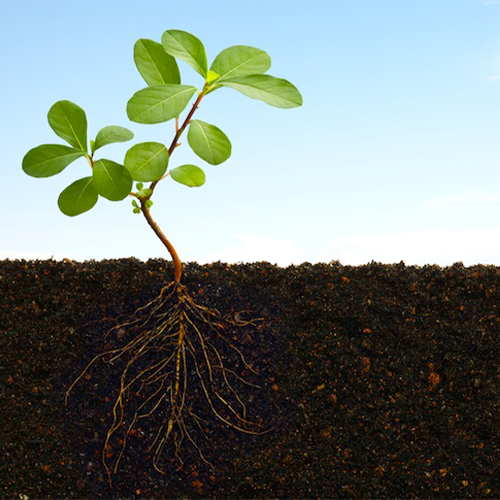
The process of building soil carbon is one that isn’t taught outside of getting a degree in agronomy. Nevertheless, it’s a complex and important function that has an immense effect on the health of our plants, soil, and planet. Building organic carbon in the soil not only creates a healthier growing environment, but the process also pulls excess carbon out of the atmosphere. Farmers and horticulturists can facilitate this process by using foliar applications for nutritional inputs. Foliar applications can be used to increase soil carbon by making carbon more available to the leaf surface, which the plants will then sequester into the soil.
This process starts with photosynthesis. Photosynthesis is a chemical process where plants will take in water and carbon dioxide, and use the energy gained from sunlight to transform those inputs into oxygen and food (in the form of sugar). This process is the most important biological process on Earth. Without it, life as we know wouldn’t exist.
Resynthesis is the next part of this multi-step process. This step is where those sugars, mostly glucose, are changed into a variety of different metabolites and carbon compounds. This is the step that ensures the nutrient density of your crops.
Exudation, when root exudates are formed, is where those sugars and metabolites are pushed into the soil. The types of compounds being exuded includes sugars, fats, enzymes, and acids. Productive plants can spend over half of the energy generated through photosynthesis on building these root exudates. As more root exudates are developed, the root systems of plants will grow larger and deeper.
The last step of this process is the most critical to building soil carbon: humification. The compounds being released into the soil through exudation need to be processed by microbes at the root for the carbon from this process to be built up in the soil. Root exudates that are not processed by microbes will simply oxidize and return to the atmosphere. Bacteria are needed to process sugars, and fungi are needed to process the lipids and oils generated. This is why diverse biology is so important for both soil and plant health! It helps plants to process the diversity of inputs that they create, and to make those nutrients available in the soil.

Growing with biology is incredibly important, not only for the health of your soil, but for the health of your plants as well. Foliar applications have been shown to increase the energy plants can generate from photosynthesis. More productive plants can grow stronger root systems, which further enhances the work that microbes are able to perform in processing metabolites and exudates. This, in turn, works to increase the nutrient density and yield of your crops. CX-1 is a broad-spectrum liquid biological from Purple Cow Organics that helps to provide diverse biology to your plants and drives productivity. The more species of biology you add to your nutritional program, the more functions you’ll bring to your crops.
Want to learn about the different benefits CX-1 can bring to your fields? Contact us here!


